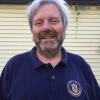The 18 U.S. bishops who conducted a 12-day prayer pilgrimage for peace in the Holy Land in September came away with new perspectives on the ongoing tensions in the Middle East, according to Bishop Oscar Cantu of Las Cruces, N.M.
He was one of the bishops who visited many of the sacred sites of Judaism, Christianity and Islam during the trip.
"The message that they receive from the media in the United States seems to lean heavily on the side of pro-Israel," Cantu said during a news conference Tuesday after making remarks earlier that day as part of the U.S. bishops' annual fall general assembly in Baltimore.
However, "on the ground, the injuries were primarily [committed] on the side of the Israelis," Cantu said. "That certainly was the truth that we witnessed. ... There were injustices on both sides. But they were not parallel."
Cantu, in his remarks to his fellow bishops, told them, "We went to pray for peace and to pray for a two-state solution and an open and shared Jerusalem." However, "arriving in the wake of the recent Gaza war," he said, "we encountered pain, intransigence and cynicism."
He added, "Even young people were discouraged. The rubble that once was their homes weighed heavily on them."
One sign of encouragement reported by Cantu was the delegation's visit to Bethlehem University, which he billed as "the only Catholic university in Israel and the occupied Palestinian territories. The student body is 70 percent Muslim and 30 percent Christian. They study together to create the future of Palestine."
Jerusalem, a city deemed holy by adherents to three major faiths, is "sadly ... a sign of contradiction. We were told more than once the city could erupt into violence, as it has on far too many occasions," Cantu said.
Further, "the towering wall that divides Israelis and Palestinians is another side of contradiction," he added. "For Israelis, it's a sign of security. For Palestinians, it's a sign of occupation and exclusion."
Cantu said, "The Christian community is emigrating at alarming rates," and he added, "The conflict undermines the viability of Christian families to raise their children."
Cantu also pointed to Palestinians getting caught up in "intimidation of military checkpoints, privation and deepening poverty."
He pointed out that a bus of bishops going to Mass in the West Bank was turned away at one Israeli military checkpoint and had to drive an extra 45 minutes to get to the Mass.
The bishops jointly celebrated a Mass with Latin Patriarch Fouad Twal of Jerusalem. "We also prayed alongside Jews, Muslims or other Christians," Cantu said. Strolling the grounds of the Dome of the Rock and drinking from Jacob's well with an Orthodox priest were among the delegation's interfaith and ecumenical encounters.
"We met with people of good will, Palestinian and Israeli alike," Cantu reported. The group met with former Israeli President Shimon Peres and Palestinian Prime Minister Rami Hamdallah.
"We know peace is possible," Cantu said, "because God is our hope." But "after another Gaza war, hope is now in short supply. What is needed now is the transformation of human hearts, so that one side's hearts is less deaf to the concerns of the other."
